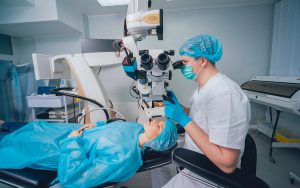
Refractive lens exchange (RLE) is a common treatment procedure for many people trying to correct their vision. One of the reasons the option is popular is the ability to personalize every treatment to fit a patient’s condition while ensuring minimal risks and the most accurate correction.
We understand the concerns that you might have before undergoing the procedure. This article will look at some of the most common questions you might have about refractive lens exchange.
1. What Is Refractive Lens Exchange?
Refractive lens exchange is a surgical procedure to replace the natural lens in your eye. The surgeon replaces the natural lens with an artificial correction lens or intraocular lens (IOL), customized to every individual’s condition.
Lens replacement surgery is a permanent solution to correct your vision.
2. How Is The Refractive Lens Surgery Performed?
A registered and experienced ophthalmologist or eye surgeon performs the procedure to replace your lens.
Before the procedure, an expert conducts a thorough eye examination to provide your physician with important information about your treatment. The doctor will give you information about the surgery, what kind of corrective lenses are available for you, and aftercare tips during the consultation.
You experience no pain during the lens replacement procedure. The surgeon will administer anaesthesia to your eye to numb the nerves. The doctor will then make a micro-incision to the side of your cornea.
This gives them access to your natural lens. The doctor then extracts the natural lens replaces it with an artificial lens implant using microinjection.
3. What Is A Cataract?
As you grow older, your natural lens can continue aging, and it starts getting harder to focus your eyesight. In other cases, the lens can get cloudier, progresses over time. This is called a cataract.
The cloudier the natural lens gets, the harder it is to focus, and over time, your vision can become completely distorted.
In some cases, the progression of the cloudiness may lead to permanent vision loss. Replacement of the cataract with a refractive lens guarantees better focus, and you retain your sight if there isn’t any other underlying condition.
You can always consult with us if you need to undergo any corrective lens surgery for your cataract replacement.
4. Are There Different Types Of Refractive Lens Replacements?
There are a variety of lens implants that can help you correct your eyesight. The two main types of lens implants to choose from are:
Monofocal lenses – These types of lenses provide good distance vision. Their function is to either correct distance vision or near vision, but not both. Due to the challenge of only correcting one condition, you might need to wear glasses. It will help you with the other compromise of your focus condition.
In some cases, your doctor might recommend blending the mono-focal lenses, using a distance lens in one eye and a near lens in the other, to help your sight focus adequately.
Multifocal lenses – Recently, manufactures have designed other lens implants have to tackle both near vision and distance vision. These lenses are called multifocal lenses. They offer a better chance of eyesight correction success, so you can see far and read a book without the need for glasses.
Multifocal lenses have various designs, all created to correct your vision while reducing your need to rely on spectacles. The most common type of lens used is the trifocal lens that allows you to see far distances, have intermediate vision focus, and see near objects. Have questions on which is the best refractive lens implant you want, consult with us and find out which are the best choices for you.
5. How Long Does The Lens Replacement Procedure Take?
Having a lens replacement surgery only takes 15-20 minutes. After the procedure, you’ll have a few minutes to rest then you can go home.
6. How Effective Is The Refractive Lens Exchange Surgery?
The lens replacement surgery is effective vision correction procedure in most patient cases. About 90% of all patients with multifocal lenses do not need to wear corrective glasses ever again.
As you get older, the ciliary muscles that hold your natural lens start deteriorating, making it difficult to have clear vision. However, the lens implants are not connected to these muscles, ensuring stable optical focus.
In addition, the lens implants don’t degrade over time, meaning unless necessary, you do not need to replace them after the procedure.
7. What Is The Recovery Period After Undergoing Refractive Lens Exchange?
The procedure is painless and takes a relatively short time. After the surgery, recovery should be quick.
During the first week of recovery, you will notice a considerable change as your vision becomes clearer. However, full recovery takes about a month. You will need to rest up for a few days. But in two or three days, you can be back in the office.
Likewise, your vision may be a little blurry for the next few days as your eyes adjust to the new lens implant.
Your doctor will prescribe eye drops that will help promote healing and prevent any infections.
8. Are There Any Side Effects To Undergoing The Lens Implant Procedure?
The surgery is a safe procedure, with a tremendous success rate. However, like any other medical procedure, there are some risks involved. Discuss any potential risks during and after the refractive lens exchange surgery with your doctor during the consultation.
9. Will I Feel The Lens Implants After The Surgery?
Unlike contact lenses, which you place on the eye, the surgeon places the refractive lens inside the eye. You will not feel the lens in your eye.
Are you thinking of getting a refractive lens exchange surgery? Please book a consultation with us. Our ophthalmologist will answer any questions you have about the procedure. Plus, you will receive knowledgeable advice on which lens implant will guarantee the best vision correction for your eyesight.




